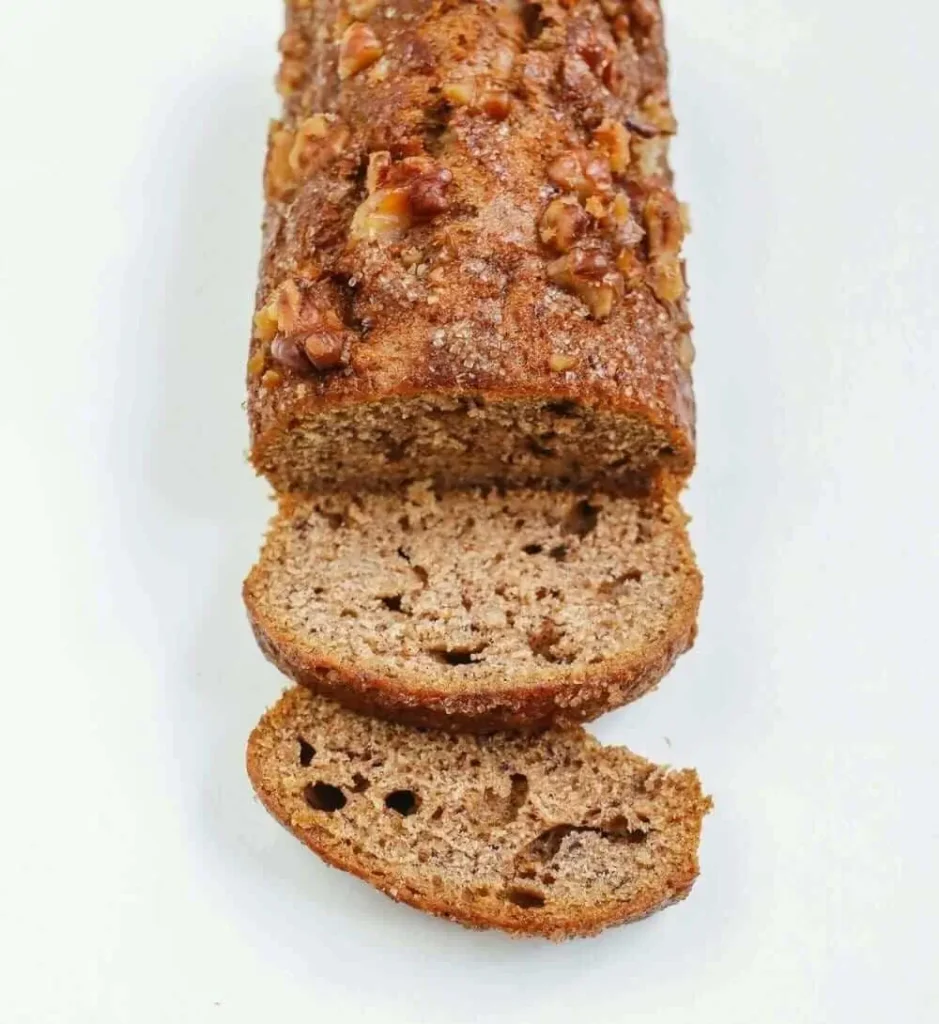Are you tempted to share a slice of banana bread with your furry friend? At PawBlooms, we know how hard it is to resist those puppy eyes, but is banana bread safe for dogs? This sweet, banana-packed treat is a human favorite, but its ingredients can pose risks for pups. In this ultimate guide, we answer can dogs eat banana bread, explore its benefits, highlight dangerous toxins, and share a dog-friendly recipe. Whether your dog sneaked a bite or you’re planning a pet-safe treat, our vet-backed advice ensures your dog stays healthy and happy. Let’s dive in!
What Exactly Is Banana Bread?
Banana bread is a moist, sweet quick bread made with mashed ripe bananas, wheat flour, sugar, eggs, butter or oil, and baking soda. Often flavored with vanilla, it may include add-ins like nuts, chocolate chips, or raisins for extra texture. It’s a popular way to use overripe bananas, but its high sugar and fat content make it more of a dessert than a health food—even for humans. For dogs, the basic ingredients aren’t inherently toxic, but certain variations can pose serious risks, as we’ll discuss below.
Is Banana Bread Safe for Dogs?

The short answer: it depends. Plain banana bread—without toxic add-ins—is generally safe for dogs in very small amounts. Bananas themselves are non-toxic and offer some nutritional benefits. However, the high sugar, fat, and calorie content make it unsuitable as a regular treat. Veterinary experts recommend strict moderation to avoid digestive upset or long-term health issues like obesity. If your recipe includes harmful ingredients, keep it far from your pup. Always consult your veterinarian before sharing human foods, especially if your dog has conditions like diabetes or pancreatitis.
Potential Toxins in Banana Bread :High Sugar, High Carbohydrates Content, Artificial Substances, Chocolate, Xylitol, Raisins, and Macadamia Nuts
Banana bread may seem harmless, but certain ingredients can be dangerous—or even deadly—for dogs. Below, we break down each potential toxin, its effects, and why you should avoid sharing banana bread containing these with your pup. Always check the ingredient list before offering human food, and consult your vet if you’re unsure.
High Sugar
Banana bread is often loaded with sugar, whether from granulated sugar, brown sugar, or sweeteners like honey. While not immediately toxic like chocolate or xylitol, high sugar content poses serious risks for dogs. Excessive sugar can lead to obesity, diabetes, and dental issues like plaque buildup or tooth decay. It can also cause short-term digestive upset, such as diarrhea or vomiting, especially in dogs with sensitive stomachs. Long-term, a high-sugar diet disrupts blood glucose levels and increases the risk of pancreatitis. For diabetic dogs, even a small amount of sugary banana bread can trigger dangerous blood sugar spikes.
High Carbohydrates Content
The refined flour (typically wheat) in banana bread contributes to its high carbohydrate content. While carbs provide energy, excessive amounts are problematic for dogs, who thrive on protein and fat-based diets. High-carb foods can lead to weight gain and obesity, particularly in less active dogs. For dogs with grain sensitivities or wheat allergies, these carbs can trigger allergic reactions, such as itching, ear infections, or gastrointestinal issues like bloating or diarrhea. Over time, a carb-heavy diet may strain a dog’s metabolism, increasing the risk of insulin resistance.
Artificial Substances
Store-bought banana bread or mixes may contain artificial substances like preservatives, artificial flavors, or sweeteners. These additives, while safe for humans, can upset a dog’s digestive system, causing vomiting, diarrhea, or allergic reactions. Some artificial ingredients may contribute to long-term health issues. Homemade banana bread allows you to avoid these additives, making it a safer choice if you control the ingredients.
Chocolate
Chocolate is a common add-in for banana bread but is highly toxic to dogs. It contains theobromine and caffeine, which dogs cannot metabolize effectively. These compounds can cause symptoms ranging from vomiting and diarrhea to seizures and even death. Dark chocolate and unsweetened baking chocolate are particularly dangerous due to higher theobromine levels, but even milk chocolate can harm small dogs. If your banana bread contains chocolate chips or cocoa, keep it far from your dog and contact a vet immediately if they ingest any.
Xylitol
Xylitol, an artificial sweetener sometimes used in “sugar-free” banana bread recipes, is extremely toxic to dogs. Even small amounts can cause a rapid drop in blood sugar (hypoglycemia), leading to weakness, vomiting, seizures, or collapse within minutes. Larger doses can result in liver failure, which may be fatal. Xylitol may be found in store-bought mixes or diet-friendly recipes, so always double-check ingredient lists. If you suspect your dog consumed xylitol, treat it as an emergency and seek veterinary care immediately.
Raisins
Raisins, a frequent mix-in for banana bread, are highly toxic to dogs, even in small quantities. Raisins (and grapes) can cause acute kidney failure, with symptoms like vomiting, lethargy, increased thirst, and decreased urine output. There’s no safe amount, so banana bread with raisins should never be given to dogs. If your dog eats any, contact your vet or an emergency hotline right away.
Macadamia Nuts
Macadamia nuts, sometimes included in banana bread, are another toxic ingredient for dogs. Even small amounts can cause weakness, vomiting, tremors, and difficulty walking. The effects can last up to 48 hours and may require veterinary intervention. Even non-toxic nuts, like almonds or walnuts, are high in fat and can cause pancreatitis, so avoid any nut-containing banana bread for your dog’s safety.
Is Banana Bread Good for Dogs?
While not ideal, banana bread can offer some benefits from its star ingredient: bananas. These fruits are packed with potassium for heart and muscle health, vitamin B6 for nervous system support, vitamin C for immunity, magnesium for energy, and fiber for digestion. However, the added sugar, fats, and refined flour negate most of these perks, potentially leading to weight gain or blood sugar spikes. It’s not a “good” food for dogs but can be an occasional indulgence if plain and homemade.
What Is Better: Store-Bought or Homemade?
Homemade banana bread is almost always the better choice for dogs. You can control the ingredients, skipping toxins like chocolate or raisins and reducing sugar. Use dog-safe substitutions like oat flour instead of wheat to make it gentler on sensitive stomachs. Store-bought versions often contain preservatives, artificial sweeteners, or hidden nuts, making them riskier. If sharing, opt for a simple homemade recipe tailored for pets.
How Much Banana Bread Can My Dog Have?
Less is more. A small bite or crumb (about 1–2 inches square) is plenty for most dogs, depending on size—smaller breeds like Chihuahuas should get even less to avoid stomach upset. Treats like banana bread should make up no more than 10% of your dog’s daily calories. Overfeeding can cause diarrhea, vomiting, or obesity. Start small and monitor your dog’s reaction.
What If Your Dog Eats a Lot of Banana Bread?
If your dog sneaks a large amount of banana bread, watch for signs of distress like vomiting, diarrhea, lethargy, or excessive thirst—especially if toxins are involved. Contact your vet or an emergency line like the ASPCA Animal Poison Control Center immediately. For plain banana bread, mild upset might resolve on its own, but induced vomiting or supportive care may be needed in severe cases.
Dog-Friendly Banana Bread Recipe
Yes! Here’s a simple, vet-approved dog-friendly banana bread recipe adapted from trusted sources. It’s gluten-free and low-sugar for safer snacking.
Ingredients:
- 2 ripe bananas, mashed
- 2 cups rolled oats (ground into flour)
- 2 eggs
- Optional: A spoonful of xylitol-free peanut butter for flavor
Instructions:
- Preheat oven to 350°F and grease a loaf pan.
- Mix mashed bananas, eggs, and oat flour until combined.
- Bake for 15–20 minutes until firm.
- Cool, slice into small pieces, and serve sparingly. Store in the fridge for up to a week or freeze for longer.
This yields about 4 dozen small treats—perfect for training or rewards.
Related Banana Bread Questions
Can Dogs Eat Banana Nut Bread?
No, banana nut bread is not safe for dogs. Nuts like walnuts and macadamia nuts are toxic, causing symptoms from vomiting to neurological issues. Even plain nuts can be high in fat, leading to pancreatitis. Stick to nut-free versions if sharing at all.
Can Dogs Eat Banana Cake?
Banana cake shares the same issues as banana bread—high sugar, fats, and potential toxins in frostings or add-ins. It’s not recommended, as it can cause digestive problems or weight gain. Opt for dog-specific treats instead.
Can Dogs Eat Banana Nut Muffins?
Similar to banana nut bread, no. The nuts pose a serious risk, and the muffin format doesn’t change the high-calorie profile. Avoid entirely to prevent toxicity or allergies.
My Dog Ate Banana Bread—What Now?
If your dog ate banana bread, assess the ingredients first. Plain? Monitor for 24 hours for upset stomach. With toxins? Seek vet care ASAP—symptoms can escalate quickly. Provide water and a bland diet if mild issues arise, but don’t induce vomiting without professional advice.
Other Banana Treats: Safe or Not?
Can Dogs Eat Banana Peels?
No, banana peels are not safe. They’re tough, high in fiber, and can cause choking, blockages, or stomach upset. Plus, pesticides on the skin add risk. Always peel bananas before offering.
Can Dogs Eat Banana Chips?
Plain, unsweetened banana chips can be a crunchy treat in moderation, offering the same banana benefits without added sugars. Avoid fried or sweetened versions, which can cause obesity or salt toxicity. Portion: a few chips for small dogs, more for larger ones.
Can Dogs Eat Banana Pudding?
Banana pudding is a no-go. It’s loaded with sugar, dairy (which many dogs are lactose intolerant to), and preservatives. This can lead to diarrhea, gas, or worse. Stick to fresh bananas for a safer option.
Pros and Cons of Banana Bread for Dogs
What’s Good About Dogs and Banana Bread?
The positives stem from bananas: fiber for gut health, potassium for muscles, and vitamins for immunity. In a dog-friendly version, it can be a fun, occasional bonding treat that satisfies your pup’s sweet tooth without harm.
What’s Not-So-Good About It?
High sugar and fats can contribute to obesity, diabetes, and pancreatitis. Refined ingredients may upset digestion, and toxins in variations pose life-threatening risks. It’s not nutritionally balanced for dogs.
Wheat Allergies and Grain Sensitivities
Many banana bread recipes use wheat flour, which can trigger allergies in sensitive dogs, causing itching, ear infections, or GI issues. Signs include chronic skin problems or vomiting. If your dog has grain sensitivities, use alternatives like oat or rice flour in homemade treats.
Final Takeaways
In summary, can dogs eat banana bread? Only in tiny, plain amounts—and preferably homemade without toxins. Prioritize your dog’s health by sticking to vet-approved treats and a balanced diet. Moderation is key to avoiding risks like obesity or poisoning. For personalized advice, chat with your veterinarian. At PawBlooms, we’re committed to helping pet parents make informed choices—explore our site for more pet nutrition tips!
FAQ:
Can dogs eat banana bread with nuts?
No, nuts like macadamia or walnuts are toxic and can cause serious health issues.
Is banana bread bad for dogs’ teeth?
Yes, the sugar can promote dental plaque and decay over time. Brush regularly or use dental chews.
Can puppies eat banana bread?
Avoid it; puppies have sensitive stomachs and need nutrient-focused foods. Start with plain bananas in tiny amounts.
What if my dog is diabetic—can they have banana bread?
Absolutely not; the sugar spikes blood glucose levels. Consult your vet for low-glycemic treats.
Can dogs eat frozen banana bread?
Freezing doesn’t change the risks—still limit to small, plain pieces.

